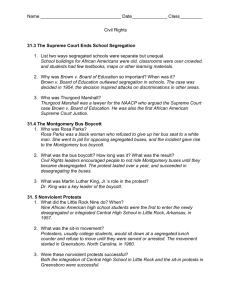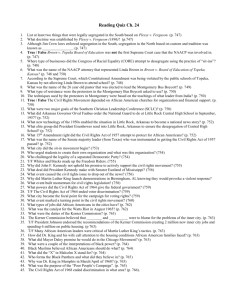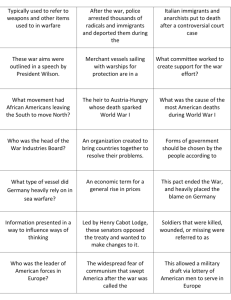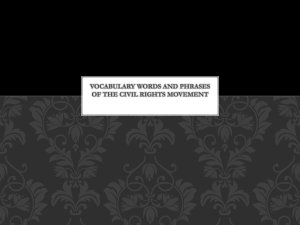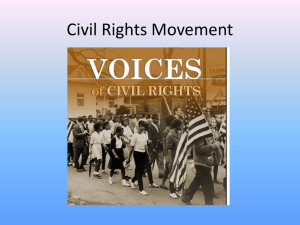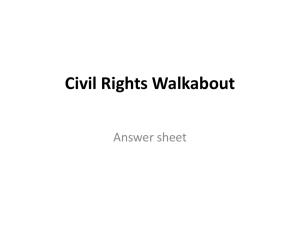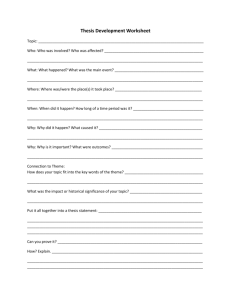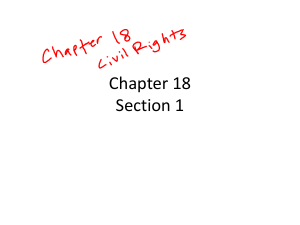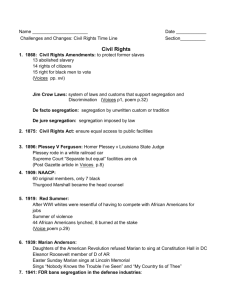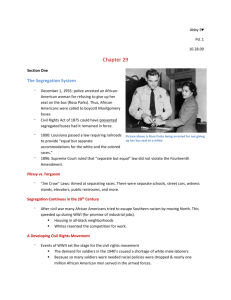Chapter 29 Study Guide
advertisement
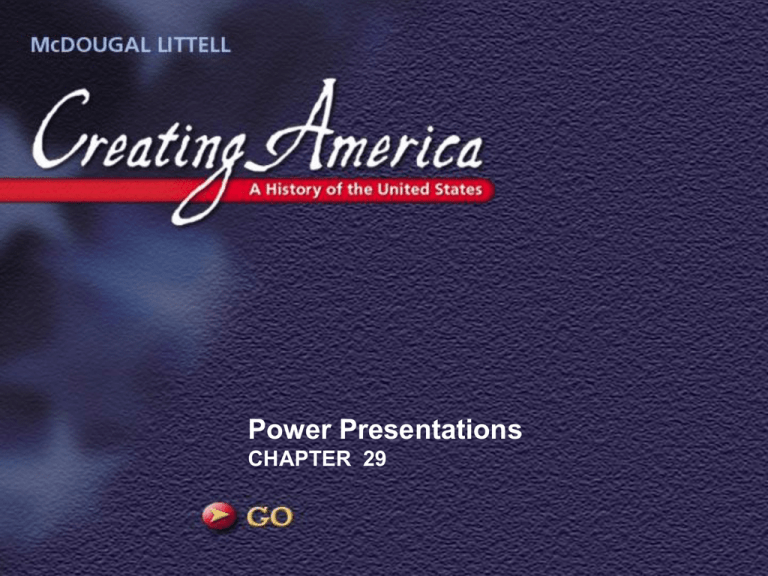
Power Presentations CHAPTER 29 Democratic Ideals Image It is 1960, and you live in a Southern city. For decades, African Americans in the South have endured racial segregation. Now they are protesting against it—in spite of the risk of being attacked. You must decide whether or not you will participate in the protests and in what way. How would you stop injustice in society? • How far would you be willing to go to help the protestors? • In what ways, besides protesting, could you help end segregation? 1954 The Supreme Court decides Brown v. Board of Education of Topeka. 1955 Montgomery bus boycott begins. 1957 Federal troops are sent to desegregate Little Rock Central High School. Image 1963 The March on Washington takes place. Kennedy is assassinated and Johnson becomes president. 1964 Congress passes the Civil Rights Act of 1964. 1965 Congress passes the Voting Rights Act. 1968 Dr. Martin Luther King, Jr., is assassinated. 1970 La Raza Unida is founded. To World 1972 Members of AIM occupy the Bureau of Indian Affairs. 1957 African nation of Ghana wins independence. 1962 African National Congress leader Nelson Mandela is imprisoned. 1967 Civil War rages in Nigeria. 1971 India and Pakistan go to war. Back to U.S. Back to Home Main Idea Changes after World War II helped African Americans make progress in their struggle for equality. Why It Matters Now The African-American struggle for equality became a model for modern protest movements. What were important events of the early civil rights movement? What did they challenge? What were the results? Brown v. Board of Education Montgomery bus boycott Early Civil Rights Movement challenged school segregation Little Rock governor sends troops to prevent integration Supreme Court rules bus segregation unconstitutional sit-ins Eisenhower sends troops to enforce integration college students try to desegregate lunch counters • How did World War II help lead to the civil rights movement? • What role did Thurgood Marshall play in challenging segregation? • How did Martin Luther King, Jr., become a well-known civil rights leader? Contrasting How did the tactics used by civil rights protestors differ from the response of many Southern whites? Think About • the Montgomery bus boycott • the events in Little Rock • the nature of sit-ins Back to Home Main Idea The civil rights movement led to the end of legal segregation. Why It Matters Now African Americans still face discrimination but now have more opportunities than before. What important events of the civil rights movement occurred between 1960 and 1968? 1960 Kennedy elected president 1961 CORE starts Freedom Rides 1963 March on Washington 1964 Civil Rights Act, Freedom Summer Image 1965 Voter registration drive in Selma, Voting Rights Act 1966 SCLC protests in Chicago 1968 King assassinated • Why did civil rights workers believe Birmingham was a good place to protest? • How did civil rights workers fight to improve African-American voting rights? • Why did the movement begin to break apart? Making Inferences Why do you think African Americans placed so much importance on the right to vote? Map Think About • who and what they might want to vote for • what they were willing to endure to win voting rights • how Southern whites kept them from voting Back to Home Main Idea The African-American struggle for equality inspired other groups to fight for equality. Why It Matters Now Nonwhites and women continue to fight for equality today. What were important details about the Mexican-American, Native American, and women’s struggle for equal rights? Mexican Americans Native Americans Women Founded La Raza Unida to fight for better wages, education, and housing Issued Declaration of Indian Purpose, Self-Determination Act of 1975 Published The Feminine Mystique, founded the National Organization for Women Image • What was La Raza Unida and what did it do? • What was the Declaration of Indian Purpose? • How did Betty Friedan help to launch the women’s liberation movement? Analyzing Points of View What were the different opinions about the ERA? Think About • what NOW and other women’s groups would have thought of it • what Phyllis Schlafly thought of it Back to Home REVIEW QUESTIONS ANSWERS: READ AND TAKE NOTES 1 What factors helped to give strength to the demands of the civil rights movement? 2 What were the immediate and long-term effects of Brown v. Board of Education of Topeka? 3 How did white people react to civil rights protests? 4 What factors made it difficult for Kennedy to act on civil rights? 5 Why did Congress eventually pass civil rights legislation? 6 What effects did Johnson’s Great Society legislation have? 7 How did farm workers participate in the civil rights movement? 8 What challenges did Hispanics face in their civil rights struggle? 9 Why did Native Americans protest U.S. government policy? 10 What kinds of discrimination did women challenge during the civil rights era? Analyzing Causes Causes Events NAACP lawyers challenge the Plessy decision. Brown v. Board of Education of Topeka Arrest of Parks and the anger of African Americans in Montgomery Montgomery bus boycott Protests in Birmingham and March on Washington increase pressure for civil rights legislation. Civil Rights Act of 1964 Protests in Selma and problems African Americans have registering to vote Voting Rights Act of 1965 Back to Home Analyzing Causes Causes Events Mexican Americans organize to fight for rights. La Raza Unida Women want more opportunities in American life. Publication of The Feminine Mystique by Betty Friedan Native Americans seek protection for their land and their traditional cultures. The federal government ends its “termination policy.” Back to Home These labels let you know where you are in the presentation. When you click on the arrow you will be linked to a related visual. Map Image These buttons link you to special areas. Use these buttons to go back to the previous slide, or to move forward in the presentation. To reveal the content of a slide just press the space bar or click your mouse once. To use a button, move your pointer over the button. When your pointer becomes a hand, click your mouse. Back to Previous
